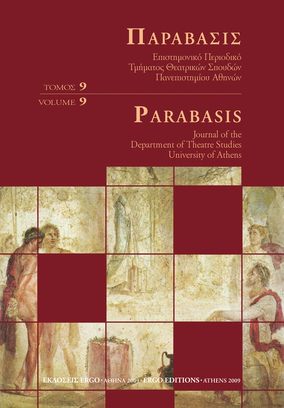Ακμή και παρακμή του σαιξπηρικού ιδεώδους στο έργο του Δημητρίου Ν. Βερναρδάκη
Part of : Παράβασις : επιστημονικό περιοδικό Τμήματος Θεατρικών Σπουδών Πανεπιστημίου Αθηνών ; Vol.9, No.1, 2009, pages 197-242
Issue:
Pages:
197-242
Parallel Title:
The rise and fall of Shakespearian rule in the dramatic production of D. N. Vernardakis
Section Title:
Μελέτες και άρθρα
Author:
Abstract:
Demetrius Vernardakis is widely recognized as the first dramatist who promoted the plays of William Shakespeare in 19th century Greece. Primarily influenced by the theories of early German Romantics, he nominated Shakespeare as the ideal model for authors interested in the creation of Greek national drama. In the beginning of his career he embraced the Shakespearian model not only in his theoretical writings but also in the construction of his plays. In Maria Doxapatri (1858) and in Cypselidai (I860) he revised and incorporated in his text some of the most celebrated scenes of Hamlet, Romeo and Juliet and Macbeth. But from the 1860s onwards, his ideas on Shakespeare began to change, in correspondence to the virulent anti- European animus of his Gr Ά post-Crimean-War environment. And his Shakespearian ideal began to fade rapidly, noi only in his theoretical writings, but also in his dramaturgy. The model of classic Greek Tragedy gained prominence now and Euripides became his authority on dramatic construction. Some of his subsequent works contain traces of Shakespearian influence (Eufrosini, 1882, and Nikiforos Fokas. 1908), but his infatuation with the English poet is definitely diminished.
Subject:
Subject (LC):
Notes:
Περιέχει πίανκες




